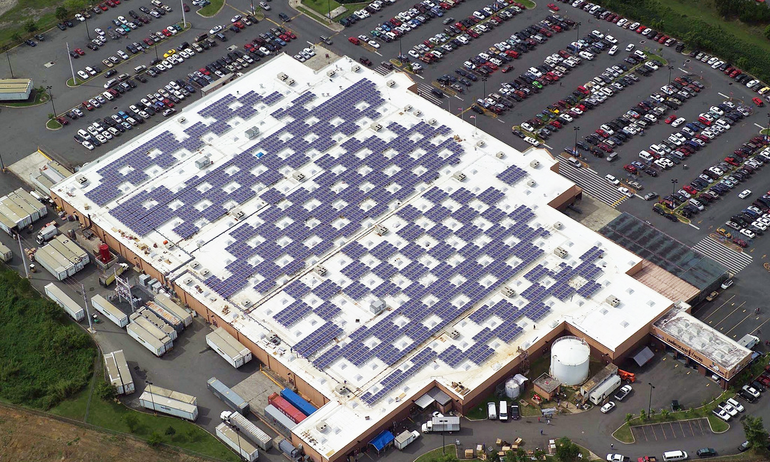More superstores should follow the leads of Wal-Mart, Costco, Kohl’s, and IKEA and use large rooftop expanses to install solar energy panels, according to a report released Wednesday.
Noting companies like Google, Coca-Cola, and Johnson & Johnson have committed to get 100 percent of their electricity from renewable sources like wind and solar, the Environment Massachusetts Research and Policy Center report says Target — which has more than 30 locations in Massachusetts — has 240 million square feet of roof space suitable for solar energy in North America, enough to power 660,000 homes.
“Solar-generated electricity benefits big-box stores by providing a low-cost, long-term energy price hedge that competes with, and in most cases outperforms, traditional power sources,” Michael Hedges, director of business development for Power Management, a company that provides energy management services to businesses, said in a statement accompanying the “Solar on Superstores” report.
Electricity produced on rooftops, close to where it will be used, also reduces losses that happen during electricity transmission — losses which totaled 5 percent of electricity sales in 2012, the report said.
The report analyzed the nation’s 96,000 big-box retailer stores, shopping centers, and grocery chains and their capacity for and progress toward rooftop solar. These stores, which use 5 percent of the nation’s electricity, have nearly 4.5 billion square feet of available flat and often sun-drenched rooftop space, enough to triple current U.S. solar capacity. That level of solar expansion would reduce carbon pollution by the equivalent of emissions from 12 million vehicles.
In Massachusetts, the rooftops of big box stores could accommodate enough solar panels to power 108,000 homes, according to the report.
On the policy front, the report urges appropriate compensation for the electricity that solar producers export to the grid, extending and maintaining state solar energy tax credits, adopting financing programs that provide businesses with low up-front costs and long-term repayment options, streamlining permitting and instituting affordable permitting fees, and enabling arrangements that allow third-party companies to own the panels and “help businesses avoid the high up-front costs of solar panel purchases.”
Of companies evaluated by the Solar Energy Industries Association (SEIA) in 2014, IKEA had the highest percentage of U.S. facilities with solar panels, ranking sixth among U.S. companies with more than 41 megawatts of total rooftop solar installed, according to the report, which was also assembled by the Frontier Group.
Costs and price concerns continue to play a role in the unfolding energy debate on Beacon Hill, where lawmakers are weighing options to fill a void left as coal plants go offline and the state’s nuclear plant in Plymouth prepares to close down.
According to the report, solar panel costs have fallen “year after year” for residential, commercial and utility-scale installations. SEIA reported that the average cost of a non-residential rooftop solar energy system was $2.07 per watt in the third quarter of 2015, down 9 percent from the same quarter in 2014.
Kohl’s has 161 solar power systems on its stores in 13 states, the report said, with each system offsetting 20 to 50 percent of its store’s energy use.
The report acknowledges that solar installation on commercial buildings can be impeded by financing difficulties and “often fall victim to the inherent complexity of commercial contracts and to misaligned incentives between building owners and retail chains.” But the report says that new financing mechanisms and risk analysis tools are being developed and introduced to address some of those problems.

